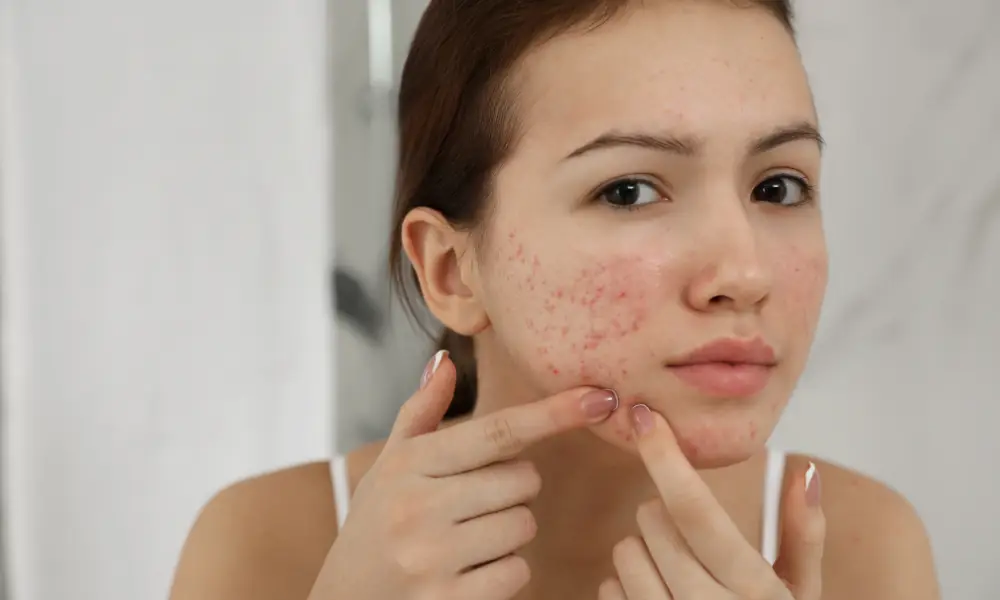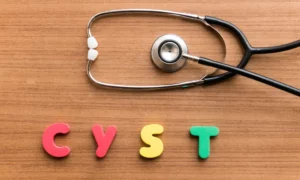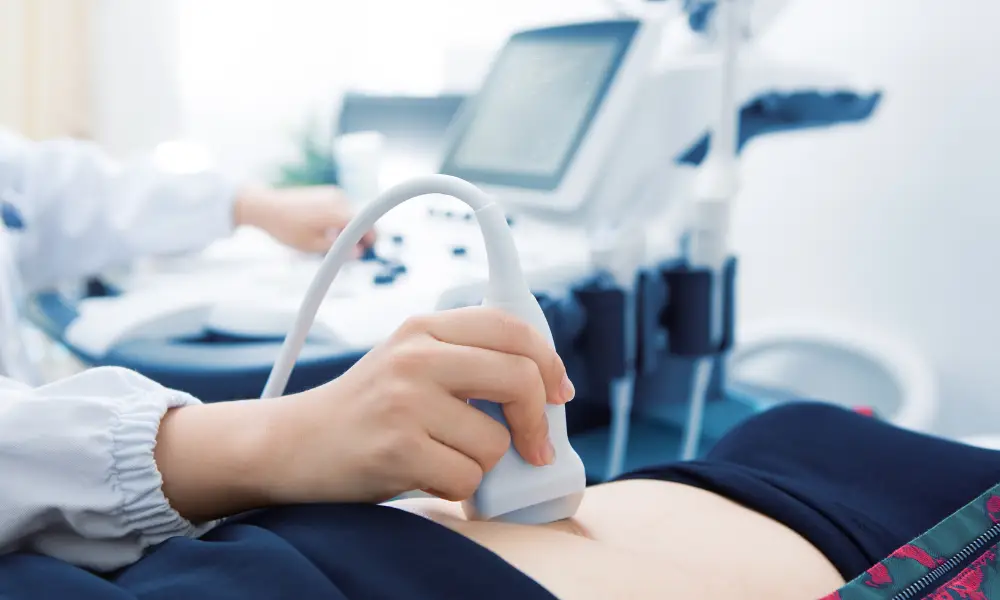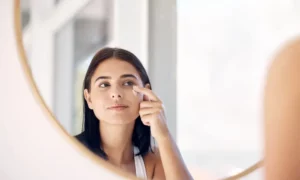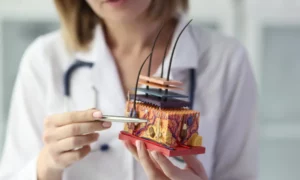Ovarian cysts, often associated with reproductive health, have a surprising connection to acne. Understanding the intricate relationship between these two seemingly unrelated issues can significantly impact how we approach their treatment. In this comprehensive guide, we delve into the science behind ovarian cyst acne treatment, their influence on hormonal balance, and effective strategies for managing acne arising from these cysts.
Contents
- 1 What Are Ovarian Cysts?
- 2 What Is The Connection Between Ovarian Cysts and Acne?
- 3 Traditional Acne Treatments vs. Ovarian Cyst-Specific Approaches
- 4 Lifestyle Changes For Managing Ovarian Cyst Acne
- 5 The Role Of Skincare In Ovarian Cyst Acne Treatment
- 6 When Should You Consult A Healthcare Professional
- 7 Conclusion
What Are Ovarian Cysts? 
Ovarian cysts are fluid-filled sacs that develop within or on the surface of a woman’s ovaries. The ovaries are two small, almond-shaped organs on either side of the uterus in the female reproductive system. These cysts are common and usually form during the menstrual cycle.
There are different types of ovarian cysts, and they can vary in size from small to large. The two main types are:
- Functional cysts: These are the most common type and often form as a normal part of the menstrual cycle. There are two subtypes:
- Follicular cysts: Form when an ovarian follicle, which is supposed to release an egg, doesn’t do so and continues to grow.
- Corpus luteum cysts: Form after the follicle releases an egg and then reseals and fills with fluid.
- Pathological cysts: These are less common and are often unrelated to the normal menstrual cycle. They can include:
- Dermoid cysts: Contain tissue, such as hair, skin, or teeth, because they develop from cells that produce human eggs.
- Cystadenomas: Develop on the surface of the ovary and are filled with a watery or mucous-like material.
- Endometriomas: Result from tissue similar to the lining of the uterus growing within the ovaries.
Most ovarian cysts are benign (non-cancerous) and resolve on their own without causing symptoms. However, some cysts may cause pain, bloating, or other symptoms. In rare cases, cysts can rupture or lead to complications, requiring medical attention. Regular gynecological check-ups can help detect and monitor ovarian cysts. If a cyst causes problems or is suspicious, further evaluation or treatment may be recommended by a healthcare professional.
What Is The Connection Between Ovarian Cysts and Acne?
There is generally no direct or established connection between ovarian cysts and acne. Acne is a skin condition that is primarily associated with hormonal changes, especially during puberty, menstruation, and pregnancy. Ovarian cysts, on the other hand, are fluid-filled sacs that form on or within the ovaries.
However, there is a link between hormonal imbalances and both acne and ovarian cysts. Hormones, particularly androgens (male hormones) like testosterone, play a role in the development of acne. Increased androgen levels can stimulate the sebaceous glands in the skin to produce more oil, leading to clogged pores and acne.
Some ovarian cysts, particularly those related to polycystic ovary syndrome (PCOS), can be associated with hormonal imbalances. PCOS is a condition where the ovaries contain many small cysts and often results in elevated levels of androgens. Women with PCOS may experience symptoms such as irregular periods, acne, and increased facial and body hair due to hormonal fluctuations.
Traditional Acne Treatments vs. Ovarian Cyst-Specific Approaches 
Traditional acne treatments and approaches specific to ovarian cysts may differ because they address distinct conditions, but there can be overlap in managing symptoms related to hormonal imbalances. Let’s explore the differences:
Traditional Acne Treatments
- Topical Treatments: Over-the-counter and prescription creams, gels, or lotions containing ingredients like benzoyl peroxide, salicylic acid, or retinoids are commonly used to reduce acne lesions by unclogging pores and reducing inflammation.
- Oral Medications: Antibiotics, oral contraceptives (especially those with anti-androgenic properties), and isotretinoin (a powerful retinoid) are prescribed to target acne from within, addressing bacteria, hormonal imbalances, and excessive oil production.
- Lifestyle Changes: Adopting a healthy skincare routine, maintaining a balanced diet, managing stress, and avoiding certain triggers can contribute to managing acne.
Ovarian Cyst-Specific Approaches
- Monitoring and Observation: Many ovarian cysts, particularly functional ones, resolve independently without intervention. Regular monitoring through ultrasound and clinical evaluations may be recommended.
- Hormonal Management: For cysts associated with hormonal imbalances, especially in conditions like PCOS, hormonal medications such as birth control pills or anti-androgen medications may be prescribed to regulate the menstrual cycle and reduce symptoms like acne.
- Surgical Intervention: If a cyst is large, causing severe symptoms, or if there are concerns about its nature, surgical options such as cystectomy (cyst removal) or oophorectomy (removal of the ovary) may be considered.
Overlap in Approaches
- Hormonal Regulation: Both acne and certain ovarian cysts are influenced by hormonal fluctuations. Medications that regulate hormones, like oral contraceptives, can be beneficial for managing symptoms in both cases.
- Lifestyle Factors: Adopting a healthy lifestyle, including regular exercise, a balanced diet, and stress management, can contribute to overall well-being and may positively impact hormonal balance, benefiting both acne and ovarian cyst management.
It’s crucial to consult with healthcare professionals for personalized advice and treatment plans tailored to your specific condition. In some cases, a collaborative approach involving dermatologists and gynecologists may be beneficial, especially when addressing conditions that involve both the skin and reproductive system.
Lifestyle Changes For Managing Ovarian Cyst Acne
While lifestyle changes alone may not directly treat ovarian cysts, they can play a supportive role in managing associated symptoms such as acne. Ovarian cysts, especially those related to conditions like polycystic ovary syndrome (PCOS), are often linked to hormonal imbalances. Here are some lifestyle changes that may help manage acne associated with ovarian cysts:
- Healthy Diet
- Include a balanced diet with a variety of fruits, vegetables, whole grains, and lean proteins.
- Limit processed foods, sugary snacks, and excessive intake of dairy products.
- Consider a low-glycemic diet, as it may help regulate blood sugar levels and reduce insulin resistance, which is common in PCOS.
- Regular Exercise
- Engage in regular physical activity, such as aerobic exercise or strength training.
- Exercise can help regulate hormones, improve insulin sensitivity, and promote overall well-being.
- Stress Management
- Practice stress-reducing techniques such as yoga, meditation, deep breathing exercises, or mindfulness.
- Chronic stress can contribute to hormonal imbalances, potentially worsening acne symptoms.
- Adequate Sleep
- Ensure you get enough restorative sleep each night.
- Lack of sleep can affect hormone levels and exacerbate acne and other symptoms associated with ovarian cysts.
- Hydration
- Stay well-hydrated by drinking an adequate amount of water throughout the day.
- Proper hydration supports overall skin health.
- Limit Alcohol and Caffeine
- Reduce alcohol consumption, as excessive alcohol intake can impact hormonal balance.
- Moderate caffeine intake, as excessive caffeine, can potentially affect hormone levels.
- Skincare Routine
- Adopt a gentle and consistent skincare routine to manage acne.
- Use non-comedogenic (non-pore-clogging) products and avoid harsh or irritating ingredients.
- Regular Check-ups
- Attend regular gynecological check-ups to monitor the ovarian cysts and receive appropriate medical guidance.
- Keep your dermatologist informed about any changes in acne or skin condition.
The Role Of Skincare In Ovarian Cyst Acne Treatment 
Skincare plays a supportive role in managing acne associated with ovarian cysts, particularly when addressing the external symptoms on the skin. While skincare alone may not treat the underlying hormonal imbalances that contribute to ovarian cysts, it can help alleviate acne-related concerns. Here are some considerations for skincare in ovarian cyst acne treatment:
- Gentle Cleansing
- Use a mild, non-comedogenic cleanser to clean the skin without stripping it of essential oils.
- Avoid harsh scrubs or abrasive cleansers that may irritate the skin.
- Non-Comedogenic Products
- Choose skincare and cosmetic products labelled as non-comedogenic, meaning they are less likely to clog pores.
- Oil-free or water-based products are often suitable for acne-prone skin.
- Moisturization
- Even oily or acne-prone skin benefits from moisturizing to maintain a healthy skin barrier.
- Opt for a lightweight, oil-free moisturizer to prevent excessive dryness.
- Acne-Fighting Ingredients
- Incorporate products containing acne-fighting ingredients, such as benzoyl peroxide, salicylic acid, or alpha hydroxy acids (AHAs).
- These ingredients can help unclog pores, reduce inflammation, and promote skin renewal.
- Sun Protection
- Use a broad-spectrum sunscreen with an SPF of 30 or higher to protect the skin from harmful UV rays.
- Some acne medications can increase sensitivity to sunlight, making sun protection crucial.
- Avoiding Irritants
- Be cautious with skincare products that may contain irritating ingredients, such as alcohol or fragrances.
- Test new products on a small area before applying them to the entire face.
- Regular Cleaning of Personal Items
- Cleanse makeup brushes, pillowcases, and any other items that come into contact with the skin regularly to prevent the buildup of bacteria.
- Consult a Dermatologist
- If over-the-counter products are not effective, consult with a dermatologist for personalized skincare recommendations and, if necessary, prescription medications.
When Should You Consult A Healthcare Professional 
It’s advisable to consult a healthcare professional, such as a gynecologist or dermatologist, for ovarian cyst acne treatment under the following circumstances:
- Persistent or Severe Acne
- If acne associated with ovarian cysts is persistent, severe, or causing distress, it’s essential to seek medical advice. Professional intervention may be necessary to prevent scarring and manage the condition effectively.
- New or Worsening Symptoms
- If you experience new or worsening symptoms associated with ovarian cysts, such as sudden pain, changes in menstrual cycles, or other concerns, consult a healthcare professional promptly.
- Concerns About Ovarian Cysts
- If you suspect or have been diagnosed with ovarian cysts and are experiencing symptoms beyond acne, such as pelvic pain, irregular periods, or changes in bowel habits, seek medical attention for a comprehensive evaluation.
- Need for Hormonal Management
- If hormonal imbalances, especially those related to conditions like polycystic ovary syndrome (PCOS), are contributing to acne, a healthcare professional can prescribe hormonal medications such as oral contraceptives or anti-androgen medications.
- Fertility Concerns
- If you have concerns about fertility due to ovarian cysts or related conditions, consulting a gynecologist is important. They can guide fertility preservation and family planning.
Conclusion
In conclusion, understanding the intricate relationship between ovarian cysts and acne is crucial for effective management. The hormonal imbalances caused by ovarian cysts can significantly impact skin health, leading to acne breakouts. This guide has provided comprehensive insights into recognizing symptoms, exploring treatment options, and incorporating lifestyle changes. Remember, you’re not alone in navigating these challenges.
If you are facing PCOS related issues, PCOS treatment at HerMantra can help. Book your free trial online pcos treatment session now.
